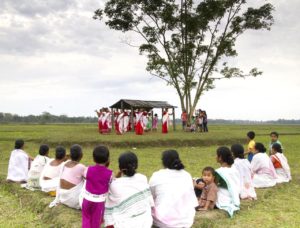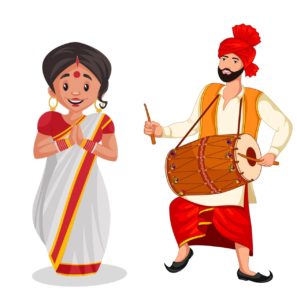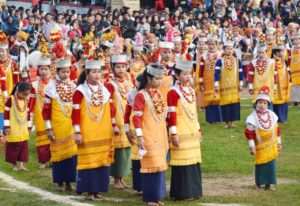By Uma Purkayastha
 Shillong, the capital of Meghalaya is a colourful city enriched with the multilingual, multi-religious culture of different communities and tribes of people. Navabarsha and Rongali Bihu are two very significant celebrations of the Bengali and Assamese communities here, observed simultaneously since the last two decades of the 19th century. The Bengali Navabarsha, which is an adieu to the outgoing year and a ceremonial welcome to the new one, falls in the mid of April of the Gregorian calendar.
Shillong, the capital of Meghalaya is a colourful city enriched with the multilingual, multi-religious culture of different communities and tribes of people. Navabarsha and Rongali Bihu are two very significant celebrations of the Bengali and Assamese communities here, observed simultaneously since the last two decades of the 19th century. The Bengali Navabarsha, which is an adieu to the outgoing year and a ceremonial welcome to the new one, falls in the mid of April of the Gregorian calendar.
Rongali Bihu of the Assamese is a festival of spring and youth celebrated at the end of the ancient Indian calendar year, which originated in the 6th Century during the reign of King Shasanka of Bengal. It was calculated by a very powerful astronomer in his courtyard on the basis of the movements of the sun, moon, stars and planets. The astronomer had pioneered the skill of making solar and lunar calendars. The calendar was approved by present-day Assam, Nepal, Odisha, Punjab and almost all the states of India because it was very much convenient for the collection of taxes and other dues from the landowners as it was related to harvesting seasons.
 The Gregorian calendar became official after the British started ruling India, but the ancient calendar continues to be followed for social and religious functions. Thus, festivals such as Bihu and Boisagu of the Bodos (Assam), Vaisakhi (Punjab) Puthandu (Tamil Nadu), Vishu (Kerala) and Navabarsha in Bengal, Tripura and Bangladesh are celebrated in mid-April. Buddhists the world over observe Buddha Purnima on the day of Vaisakhi coinciding with the nirvana or enlightenment attained by Gautama Buddha.
The Gregorian calendar became official after the British started ruling India, but the ancient calendar continues to be followed for social and religious functions. Thus, festivals such as Bihu and Boisagu of the Bodos (Assam), Vaisakhi (Punjab) Puthandu (Tamil Nadu), Vishu (Kerala) and Navabarsha in Bengal, Tripura and Bangladesh are celebrated in mid-April. Buddhists the world over observe Buddha Purnima on the day of Vaisakhi coinciding with the nirvana or enlightenment attained by Gautama Buddha.
More than a century ago, Shillong – then the capital of undivided Assam – was dominated by the members of the Bengalee Brahmo Society (non-believers in idol worship) who took the leading part in all social and cultural activities. The society introduced Navabarsha or the Bengali New Year in 1882 and its members, female and male, would gather at present-day Upper Laban early in the morning for a procession, chanting prayer songs for the welfare of the whole universe. It was called ‘Nagar Kirtan’. The main object of the celebration was mass prayer through devotional songs and discussions for universal welfare. This was followed by the distribution of sweets. This laid the foundation of the socio-religious-cultural activities in Shillong.  (Reference: ‘Maha Jeevoner Pothe’ by Saradamanjari Dutta).
(Reference: ‘Maha Jeevoner Pothe’ by Saradamanjari Dutta).
Though Shillong was the capital of Assam since 1874, the Assamese community did not settle in the hill town on a large scale before 1920. Since that year, the socio-cultural activities of the Assamese community started in full swing. In 1935, the first community Rongali Bihu in Shillong was held on the field of Laban Assamese Boys’ High School complex with traditional Bihu dance and songs. Sports were also part of the special events that were organised. (Reference: ‘Ajo nityah’ by Kaverri, chapter 39).
The non-Brahmo Bengalis in Shillong used to organise puja and prayers to greet the new year with sanctity and entertain people with homemade sweets. It was the day of get-together for the exchange of love, and for strengthening the bond of friendship and fraternity. The tradition continues but Navabarsha has become more cultural than religious today.
 Since the time of poet laureate Rabindranath Tagore, the Navabarsha Utsav took a cultural turn in Bengal. The bard used to celebrate the day in Shantiniketan through cultural programmes to bid adieu to the old year and greet the New Year. The festival was named ‘Varsho Baran Utsav’, meaning “greeting the New Year”.
Since the time of poet laureate Rabindranath Tagore, the Navabarsha Utsav took a cultural turn in Bengal. The bard used to celebrate the day in Shantiniketan through cultural programmes to bid adieu to the old year and greet the New Year. The festival was named ‘Varsho Baran Utsav’, meaning “greeting the New Year”.
Following Tagore, the people of Bengal started celebrating the day with cultural programmes in addition to religious functions. Gradually, the practice reached the erstwhile undivided Assam, and Shillong being the administrative hub of the region, started Navabarsha with cultural programmes.
The Assamese word Bihu has come from the Sanskrit word ‘Visuba’ (equinox). On the day of the equinox, the sun appears to rise “due east” and set “due west”. This occurs twice every year, in March and September. The first equinox is called ‘Maha Vishuba’ in Sanskrit, which usually falls on April 14 and is observed as Rongali Bihu.
The first Bihu organising body in Shillong was the Shillong Central Rongali Bihu Celebration Committee. Later on, the Meghalaya Rongali Bihu Celebration Committee was formed comprising people of Laitumkhrah, Dhankheti, Malki, Nongthymmai and other areas. The venue of the celebration was Assam Kristi Kendra, Dhankheti. Now, both the committees celebrate Rongali Bihu with pomp and gaiety.
The main attraction of Bihu is the dance and songs to the accompaniment of drums and the buffalo-horn pepa. The tune is intoxicating, attracting the young and old alike irrespective of caste, creed and religion. The public Rongali Bihu festival in Shillong continues for three days. Nowadays, Bihu accommodates cultural programmes of other communities, making it a secular festival.
This year, Bihu and Navabarsha are in the same space as Good Friday, Easter and Ramzan or the month of fasting for Muslims. This underlines the message of love and harmony the festivals and observances convey.
Let the darkness across the globe be erased by the brightness of the Assamese and Bengali New Year, as the term ‘Jogoto okhilasya mangalam’ (welfare of the whole universe) underlines.



